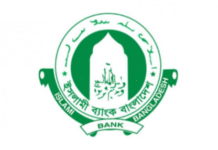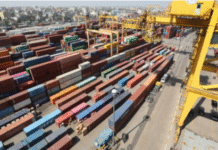
A file photo shows a worker handling a machine at a spinning mill in Dhaka. Traders will have to disclose the relevant bank account information to the tax authority as proof of transactions for getting tax credit or VAT rebate. — New Age photo
Traders will have to disclose the relevant bank account information to the tax authority as proof of transactions for getting tax credit or VAT rebate.
The Bangladesh government included a provision in the Value-Added Tax Act-1991 in this connection through the Finance Bill-2018 of the national budget for the next fiscal year of 2018-2019.
The decision was taken to prevent misuse of input tax credit system and illegal VAT rebate taken by businesses through providing false transaction information, officials of the National Board of Revenue said.
They said that the government also simplified the examination procedure of export goods at port to make the export process smooth and reduce harassment of exporters.
The revenue board proposed bringing an amendment to the VAT Rules-1991 to simplify the export process.
According to the VAT law, traders and suppliers are entitled to receive input tax credit or VAT rebate against the VAT paid on goods and services.
They, however, can not claim VAT rebate if the payment is made without banking or electronic medium for purchase of inputs worth Tk 1 lakh or above.
According to the NBR officials, in many cases traders provide information of a bank account which was hardly used for transaction for sales or purchase.
Traders can now show transactions made through any bank account for the purpose.
The law allows them to claim VAT rebate against the transactions made through any bank account irrespective of whether the information related to the account has been disclosed or not, they said.
Taking the advantage of the weakness in the law, many dishonest traders claim VAT rebate providing false information as the VAT officials cannot verify the information in absence of information related to that bank account.
The government this time proposed changing the provisions of the VAT act to make mandatory disclosure of the bank accounts for claiming the rebate, said an official of the NBR.
He said that traders now would not be able to claim VAT rebate if the information of the bank accounts through which the transactions were made were not disclosed to the VAT authority.
VAT officials will deny the VAT claim against any transaction through undisclosed bank accounts, he added.
Under the proposed amendment to the VAT rules, exporters would be able to examine their exportable goods at port without prior approval of the local VAT office.
Exporters will just submit application with challan to the local VAT office and the office will preserve the copy of the application.
Customs officials will examine the export goods and give permission for export.
Currently, exporters need to apply to the local VAT office and any officer of the office stamps with a seal mentioning ‘examination would be completed at the port of export’.
Then he gives the permission for sending the goods at the port of export.
The process causes harassment as in most of the cases VAT officials visit the business premises of exporters for giving approval.
Exporters can complete examination process of exported goods both at their business premises and in the port of export.
Source: New Age.









